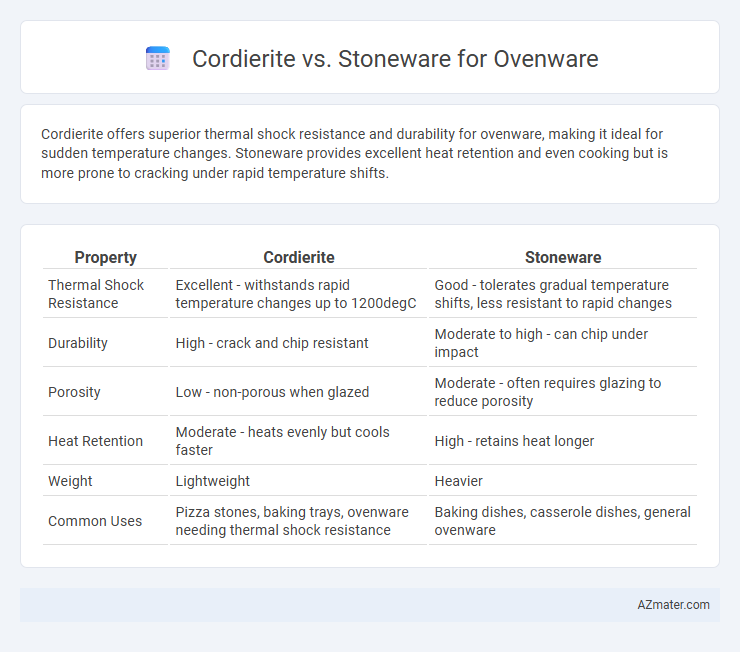Cordierite offers superior thermal shock resistance and durability for ovenware, making it ideal for sudden temperature changes. Stoneware provides excellent heat retention and even cooking but is more prone to cracking under rapid temperature shifts.
Table of Comparison
| Property | Cordierite | Stoneware |
|---|---|---|
| Thermal Shock Resistance | Excellent - withstands rapid temperature changes up to 1200degC | Good - tolerates gradual temperature shifts, less resistant to rapid changes |
| Durability | High - crack and chip resistant | Moderate to high - can chip under impact |
| Porosity | Low - non-porous when glazed | Moderate - often requires glazing to reduce porosity |
| Heat Retention | Moderate - heats evenly but cools faster | High - retains heat longer |
| Weight | Lightweight | Heavier |
| Common Uses | Pizza stones, baking trays, ovenware needing thermal shock resistance | Baking dishes, casserole dishes, general ovenware |
Introduction to Cordierite and Stoneware Ovenware
Cordierite ovenware is renowned for its exceptional thermal shock resistance, making it ideal for rapid temperature changes in ovens and broilers, while stoneware ovenware offers excellent heat retention and even cooking due to its dense, non-porous structure. Cordierite, a mineral-based ceramic, withstands high temperatures without cracking, providing durability and longevity for frequent oven use. Stoneware, crafted from refined clay fired at high temperatures, ensures strong, chip-resistant dishes that retain heat well, enhancing cooking performance and food presentation.
Composition and Material Properties
Cordierite ovenware, composed primarily of magnesium iron aluminum cyclosilicate, offers exceptional thermal shock resistance due to its crystalline structure, making it ideal for rapid temperature changes in ovens. Stoneware, made from dense, non-porous clay fired at high temperatures, provides superior durability and heat retention but is less resistant to sudden thermal shocks compared to cordierite. The mineral composition of cordierite results in lightweight, highly heat-tolerant ceramics, whereas stoneware's robust clay matrix ensures strong mechanical strength and even heat distribution during baking.
Heat Resistance and Thermal Shock
Cordierite exhibits exceptional heat resistance, tolerating temperatures up to 1430degF (777degC), and offers superior thermal shock resistance, making it ideal for ovenware that faces rapid temperature changes. Stoneware, while heat resistant up to approximately 1200degF (649degC), is more prone to cracking under thermal shock due to its denser composition. The thermal properties of cordierite reduce risk of breakage during sudden heating or cooling cycles, enhancing durability and performance in high-temperature cooking applications.
Cooking Performance and Heat Distribution
Cordierite offers superior thermal shock resistance and even heat distribution, making it ideal for ovenware that requires consistent cooking temperatures without cracking. Stoneware retains heat well but may heat unevenly, potentially causing hot spots that affect cooking performance. Cordierite's durability and ability to quickly adapt to temperature changes enhance baking results, while stoneware excels in maintaining warmth after cooking.
Durability and Longevity
Cordierite is known for its exceptional thermal shock resistance, making it highly durable for ovenware that undergoes rapid temperature changes. Stoneware offers strong durability with a dense, non-porous structure that provides long-lasting performance but may be less resistant to sudden heat spikes. For longevity, cordierite's ability to withstand extreme heat cycling often results in a longer lifespan compared to traditional stoneware.
Weight and Handling
Cordierite ovenware is significantly lighter than stoneware, making it easier to handle and maneuver, especially when transferring hot dishes in and out of the oven. The lightweight nature of cordierite reduces strain and enhances comfort during cooking, while stoneware tends to be heavier and bulkier, requiring more careful handling. Despite the weight difference, both materials offer excellent heat retention and durability, but cordierite's lighter weight provides a practical advantage in everyday use.
Ease of Cleaning and Maintenance
Cordierite ovenware offers superior ease of cleaning due to its non-porous surface, which resists staining and food residue buildup more effectively than stoneware. Stoneware often requires careful hand washing and can retain odors or grease in its micro-pores, making maintenance more labor-intensive. The durability of cordierite also means fewer cracks and chips during cleaning, ensuring long-term usability with minimal effort.
Price Comparison
Cordierite ovenware generally commands a higher price due to its superior thermal shock resistance and durability, making it ideal for extreme temperature changes in cooking. Stoneware tends to be more budget-friendly while still offering good heat retention and even cooking, but it may be prone to cracking under rapid temperature shifts. Price differences reflect these material properties, with cordierite positioned as a premium choice for frequent, high-temperature oven use.
Best Uses: Baking, Roasting, and Beyond
Cordierite ovenware excels in thermal shock resistance, making it ideal for baking and roasting at high temperatures without cracking, perfect for pizza stones and roasting pans. Stoneware offers superior heat retention and even heat distribution, enhancing the flavor and texture of baked goods like bread, casseroles, and cakes. Both materials are non-porous and durable but Cordierite's rapid heating properties suit quick temperature changes, while Stoneware's steady heat makes it excellent for slow roasting and baking.
Which Is Right for Your Kitchen?
Cordierite ovenware is prized for its superior thermal shock resistance, making it ideal for rapid temperature changes and ensuring durability during frequent oven use. Stoneware, known for its dense, heat-retentive properties, offers excellent even cooking and a naturally non-porous surface that resists stains and odors. Choosing between cordierite and stoneware depends on your cooking style: cordierite suits high-temperature, quick transitions, while stoneware excels in steady, uniform heat for baking and roasting.

Infographic: Cordierite vs Stoneware for Ovenware
 azmater.com
azmater.com